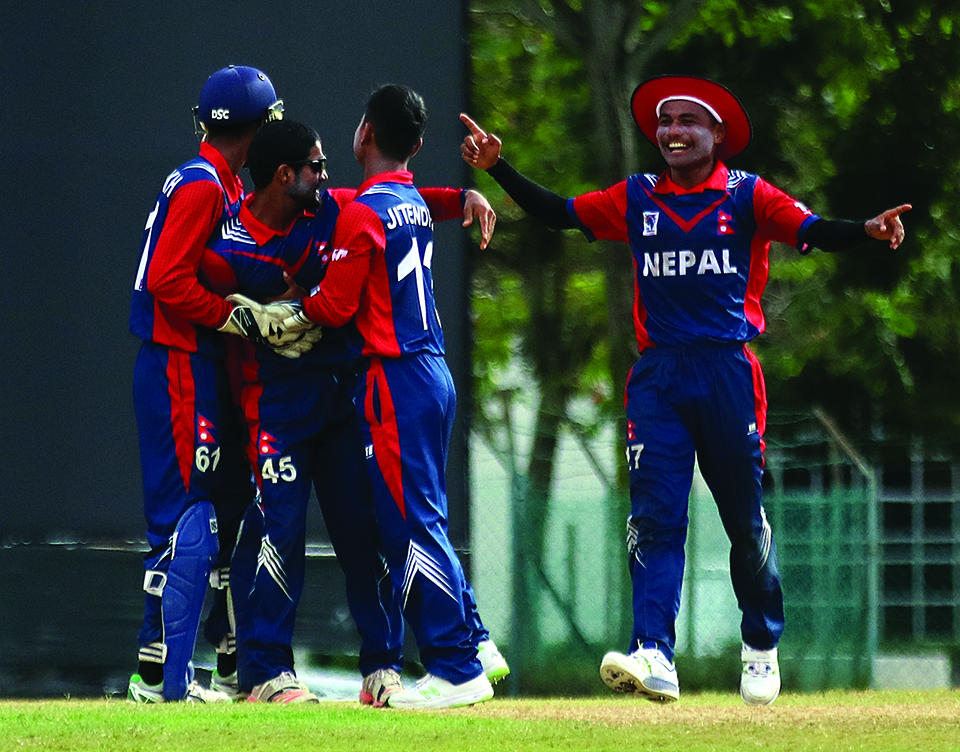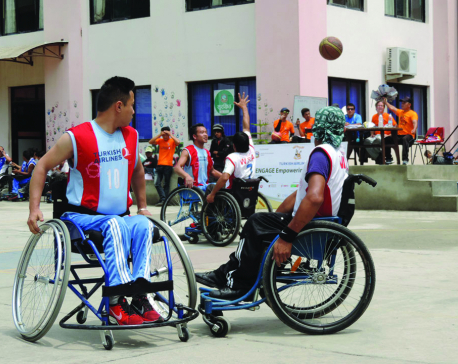
OR


Simone Galimberti
Simone Galimberti is the Co-Founder of ENGAGE, an NGO partnering with youths to promote social inclusion in Nepal.simone_engage@yahoo.com
Professional sports have a large, untapped potential for development. Cricket is perhaps the best hope for Nepal
Recently Catholic University of the Sacred Heart in Milan hosted a very important forum focused on ‘Sport for Social Inclusion and Development’ with almost hundreds of international participants.
Sport for social inclusion is a popular framework of sport for peace and development that counts with hundreds of initiatives all over the world, from programs focused on working with homeless to initiatives focused on migration, conflict management, and girls’ empowerment just to mention a few impact areas.
The gathering in Milan was important as it worked as follow up to Kazan Action Plan that was developed during Sixth International Conference of Ministers and Senior Officials Responsible for Physical Education and Sport (MINEPS VI) held in Kazan, Russian Federation last July.
The Kazan’s document can be considered as a major stepping stone to put in practice the International Charter of Physical Education, Physical Activity and Sport, a potentially groundbreaking document that can literally contribute to holistic development of children and adults by leveraging sports in general physical education.
Educational institutions play an important role in building sport champions. In the US college sports serve as feeder to professional careers. Paradoxically, creating next champion is just a byproduct (and surely a secondary goal) of the Charter that was adopted in Berlin in 2013 and the Kazan Plan of Action.
Real potential of promoting physical education and sports at school level has a far bigger scope for the holistic development of a child. This is mentioned in the Charter. Article 1 states: “The practice of physical education, physical activity and sport is a fundamental right for all” while Article 2 highlights that “physical education, physical activity and sport can yield a wide range of benefits to individuals, communities and society at large”.
In this context Kazan Action Plan has the ambition of overcoming rhetoric, shifting, in high gear, from words to deeds, getting the commitment of governments around the world to invest in sports and physical education.
UNESCO is the “guardian” and “promoter” of the Action Plan. This body, which works for promotion of education, culture and science, could take charge of leveraging sport for peace and development through its partnerships among UN agencies, development partners, corporates and other not for profits.
In a marked contrast to similar official action plans approved at these levels, Kazan has a strong focus on practical implementation in particular towards a) universal access, b) maximizing the contributions of sports to Sustainable Development, a clear reference to the Agenda 2030 and c) the much-discussed topic of sports integrity.
It should not be a coincidence that the summit in Milan counted also on the participation of a strong delegation from the Russian Federation that was so instrumental in achieving the ambitious plan of action in Kazan.
The forum in Milan, organized by Postgraduate School of Psychology “Agostino Gemelli”, itself an indicator of links between psychology and the impact of sports in people’s behavioral changes, brought together the best minds of the sector, offering an intimate environment to share, learn and move forward with the implementation of action plan.
Professor Naofumi Suzuki, a dynamic scholar from Japan, proposed to create agency through sport, underscoring what he defined as “a capability approach to self-empowerment.” Professor Colin Higgs, another eminent expert, said programs must be focused on stages of development as sports can develop competence, confidence, control, coping, contribution, character and connection.
What Nepal can do
So what should a country like Nepal get from such meetings? How can the country invest in sports and physical education?
First, hopefully, International Olympic Committee saga with the recent ruling of Supreme Court will be solved once for all. Second, National Sport Council could lobby for more resources to be invested in sport through enhanced accountability and transparency and expedite “working relationship” with new provinces and local governments that will also have an important role to play.
Third, professional sports have still a large, untapped potential for development. Cricket is perhaps the best hope on how the country can also develop excellence if the private sector steps in providing that “governance and management” issues are settled for good.
Fourth, Ministry of Education has also a key role as physical education practiced at schools can truly promote wellbeing of the students while contributing to develop the best talents though there is enormous room for improvement.
Fifth, the private educational institutions are already important players as you can see from the numerous basketball tournaments being organized by schools and colleges in an independent and autonomous way. Yes, this is not enough but at least balls keep bouncing in the courts in many urban spaces thanks to private colleges.
Finally, Nepal could raise its ambition and profile and seriously contribute to the running of recently established Asia- Pacific Youth and Sport Task Force, a collective initiative of practitioners and policymakers focused on youths related sports programs.
In her official address to MINEPS VI, then UNESCO Director-General, Irina Bokava said: “Sport can bring people and culture together around shared values. Sport and physical education are vital to young people to healthy life and resilient societies”.
Nepal can bring together all the existing initiatives, including its excellence in adaptive sports, to become a pioneer in the implementation of Kazan Acton Plan. Given the political will, this can be possible.
The author is Co-Founder of ENGAGE,
an NGO partnering with youths living
with disabilities
simone_engage@yahoo.com
You May Like This

Sports for inclusion
Through sports, people with disabilities acquire vital social skills, develop independence, and become empowered to act as agents of change Read More...

Sports minister KC inspects sports offices
KATHMANDU, August 1: Newly appointed Minister for Youth and Sports Rajendra Kumar KC today while inspecting the offices related to... Read More...

Sports Minister praises far-west contribution to sports sector
BHIMDATTANAGAR, Oct 5: Minister for Youth and Sports Daljit Sripali has praised the contribution of the far-western region to the... Read More...




Just In
- Govt receives 1,658 proposals for startup loans; Minimum of 50 points required for eligibility
- Unified Socialist leader Sodari appointed Sudurpaschim CM
- One Nepali dies in UAE flood
- Madhesh Province CM Yadav expands cabinet
- 12-hour OPD service at Damauli Hospital from Thursday
- Lawmaker Dr Sharma provides Rs 2 million to children's hospital
- BFIs' lending to private sector increases by only 4.3 percent to Rs 5.087 trillion in first eight months of current FY
- NEPSE nosedives 19.56 points; daily turnover falls to Rs 2.09 billion















Leave A Comment